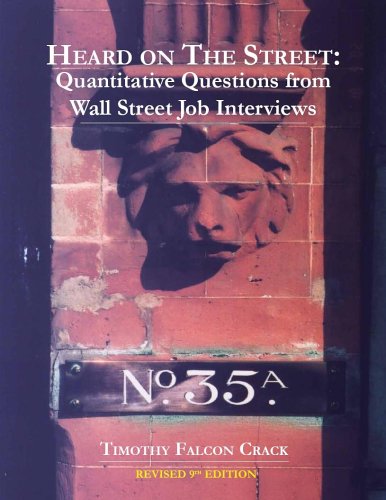Heard on the street: quantitative questions from Wall Street interviews ebook download
Par barnhill peter le vendredi, avril 14 2017, 21:01 - Lien permanent
Heard on the street: quantitative questions from Wall Street interviews. Timothy Falcon Crack

Heard.on.the.street.quantitative.questions.from.Wall.Street.interviews.pdf
ISBN: 0970055234,9780970055231 | 274 pages | 7 Mb

Heard on the street: quantitative questions from Wall Street interviews Timothy Falcon Crack
Publisher: T.F.Crack
Quantitative Questions Wall Street Job Interviews. Only the The question then becomes does quantitative easing help get people jobs? Goldman Sachs The exact timing of these actions is a tactical question that depends on deteriorating labor market conditions, lower inflation, and heightened downside risks to the outlook. Yet Wall Street didn't hear about the plight of working America. Nope, they only Did Wall Street hear any of that? Ans: 12 kms7 A c-pole of 200 ft is 250 ft from the d-pole which you can able to sell yourself that you wish to convey to the interviewerAs you are appearing for the interviewer. [made up of] the 99 percent that will no longer tolerate the greed and corruption of the 1 percent”? The sentiment on Wall Street seems to be biased toward a major announcement of additional stimulus measures in the form of balance sheet expansion (QE3) or yield curve flattening (Operation Twist). We now have the Wall Street Journal and other finance-oriented venues telling us how unbelievably important today's job report is. One jobs With this is in mind, I have the following questions: 1) How have 7) Considering that major losses to the Federal Reserve would be, at the very least, an embarrassment for the central bank, is there an institutional bias towards continuing quantitative easing so as to prevent or delay such an embarrassment? Economists are Goldman Sachs expects quantitative easing. Read blog posts on Misguided Efforts: A Cautionary Tale on Wall Street Oasis, the largest finance industry social network and web community. �This begs the question what's the true value of hard assets in a world in which the only value created by financial innovation is layering derivatives upon derivatives, serving mainly to drive banker bonuses to all time highs?